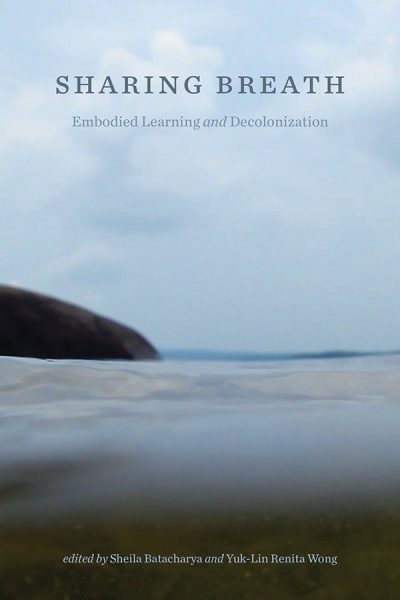Treating bodies as more than discursive in social research can feel out of place in academia. As a result, embodiment studies remain on the outside of academic knowledge construction and critical scholarship. However, embodiment scholars suggest that investigations into the profound division created by privileging the mind-intellect over the body-spirit are integral to the project of decolonization.
The field of embodiment theorizes bodies as knowledgeable in ways that include but are not solely cognitive. The contributors to this collection suggest developing embodied ways of teaching, learning, and knowing through embodied experiences such as yoga, mindfulness, illness, and trauma. Although the contributors challenge Western educational frameworks from within and beyond academic settings, they also acknowledge and draw attention to the incommensurability between decolonization and aspects of social justice projects in education. By addressing this tension ethically and deliberately, the contributors engage thoughtfully with decolonization and make a substantial, and sometimes unsettling, contribution to critical studies in education.
With contributions by Temitope Adefarakan, Candace Brunette-Debassige, Susan Ferguson, Katie MacDonald, Jamie Magnusson, Stephanie Moynagh, Devi Dee Mucina, Denise Nadeau, Roxana Ng, Randelle Nixon, Wendy Peters, Carla Rice, Sheila Stewart, and Alannah Young Leon.
An extremely refreshing book in what is considered curriculum studies. […] Squarely situated in a Canadian context where the decolonization struggles of Indigenous people in Canada is the primary source of political, social, economic, and cultural injustice, the book is nonetheless theoretically and empirically rich enough to inform studies of embodiment in North America more broadly.
Wayne Yang, University of California San Diego
About the Editors
Sheila Batacharya completed her doctoral studies at the Ontario Institute for Studies in Education, University of Toronto. She has taught education, women’s and gender studies, criminology and sociology courses at several colleges and universities in southern Ontario. Sheila’s scholarship in embodiment and embodied learning is fueled by her experiences teaching yoga and her curiosity and concern with articulating and practicing attunement to social-sentient embodied experiences in formal education and community contexts. Yuk-Lin Renita Wong is an associate professor at the School of Social Work at York University. Her scholarship and teaching aim at deconstructing the colonial, racial, and gender power relations in the knowledge production and discursive practices of social work, and in re-centering marginalized ways of knowing and being. Mindfulness and social justice are inseparable in Renita’s practice in and outside of the academy.
Table of Contents
- Acknowledgements
- Introduction
- 1. Decolonizing Teaching and Learning Through Embodied Learning: Toward an Integrated Approach / Roxana Ng
- 2. Embodying Indigenous Resurgence: “All Our Relations” Pedagogy / Alannah Young Leon and Denise Nadeau
- 3. The Journey to You, Baba / Devi Dee Mucina
- 4. Being Moved to Action: Micropolitics, Affect, and Embodied Understanding / Randelle Nixon and Katie MacDonald
- 5. Volatile Bodies and Vulnerable Researchers: Ethical Risks of Embodiment Research / Carla Rice
- 6. Resistance and Remedy Through Embodied Learning: Yoga Cultural Appropriation and Culturally Appropriate Services / Sheila Batacharya
- 7. From Subjugation to Embodied Self-in-Relation: An Indigenous Pedagogy for Decolonization / Candace Brunette-Debassige
- 8. Integrating Body, Mind, and Spirit Through the Yoruba Concept of Ori: Critical Contributions to a Decolonizing Pedagogy / Temitope Adefarakan
- 9. “Please Call Me by My True Names”: A Decolonizing Pedagogy of Mindfulness and Interbeing in Critical Social Work Education / Yuk-Lin Renita Wong
- 10. Poetry: Learning Through Embodied Language / Sheila Stewart
- 11. Patient Stories: Renarrating Illness and Valuing the Rejected Body / Wendy Peters
- 12. Embodied Writing and the Social Production of Pain / Susan Ferguson
- 13. Class and Embodiment: Making Space for Complex Capacity / Stephanie Moynagh
- 14. Fighting Out: Fractious Bodies and Rebel Streets / Jamie Magnusson
- Afterword / Sheila Batacharya and Yuk-Lin Renita Wong
This work is licensed under a Creative Commons License (CC BY-NC-ND 4.0). It may be reproduced for non-commercial purposes, provided that the original author is credited.
